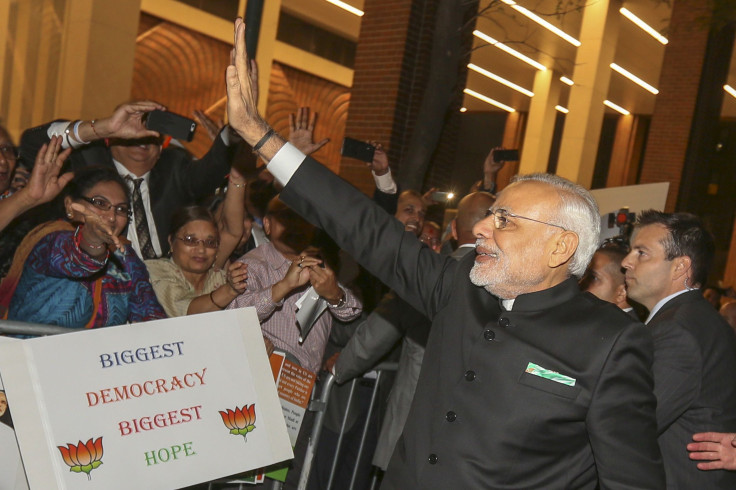Narendra Modi US Visit: Indian Leader Woos Silicon Valley With Promise Of Reforms

Kicking off his second visit to the United States in a year, Indian Prime Minister Narendra Modi pushed for investments in the country during a meeting with 47 CEOs of Fortune 500 companies, including JP Morgan, Citigroup and AIG Insurance, at California’s Silicon Valley late Thursday. During his five-day visit, Modi was also scheduled to meet tech leaders such as Apple’s Tim Cook, Microsoft’s Satya Nadella and Facebook’s Mark Zuckerberg.
“Foreign direct investment all over the world has fallen. But in India, it increased by 40 percent. This reflects confidence in the Indian economy. … Reform in governance is my No. 1 priority. We are for simplified procedures, speedy decision-making, transparency and accountability,” Modi said, during the meeting, adding that any existing “bottlenecks” to foreign investment will be removed.
Over the past 16 months, Modi has aggressively campaigned for his government’s “Make in India” initiative, which seeks to turn the Southeast Asian nation into a global manufacturing hub. Additionally, Modi also hopes to woo investors for his “Digital India” plan -- an ambitious $18 billion project to provide Internet access to Indian cities and villages.
The $ 4.5 trillion club! PM @narendramodi with leading Fortune 500 CEOs at a special event in New York pic.twitter.com/PhXNUR9DeN
— Vikas Swarup (@MEAIndia) September 24, 2015India currently has the world’s third-largest number of Internet users. However, only 20 percent of the country’s 1.2 billion people have access to the Internet, according to a recent study by the Pew Research Center.
“It’s great obviously to be expanding Internet access and try and mobilize it to provide investment and IT jobs,” Rikin Gandhi, an Indian-American who founded Digital Green, a nonprofit that provides technology assistance to small farmers, told the Washington Post. "But there is still much left to be desired with regard to basic access to services like electricity and road connectivity.”
The globe-trotting Indian leader -- who has made 27 foreign trips since he took over as the prime minister last May -- has also faced criticism from many, both at home and abroad, for his failure to speed up reforms necessary to generate economic investment. Bills such as those aiming to make it easier for private businesses to acquire land, or calling for the introduction of a nationwide goods and services tax have stalled in the Indian parliament.
“Modi is trying to convince innovators and investors in the U.S. that India is an easier place to invest in but there’s a growing perception that he is all talk and no action on reform,” Michael Kugelman, South Asia specialist at Washington’s Woodrow Wilson Center, told the Guardian. “When he was made prime minister, there was tremendous excitement in the [US] community but expectations have not been met.”
Later on Monday, Modi is also scheduled to meet U.S. President Barack Obama on the sidelines of a United Nations summit. Ben Rhodes, Obama’s deputy national security adviser, said that climate change is likely to be a key issue during the meeting.
“Notably, India will be critical to a successful global effort to combat climate change, so the two leaders will certainly address their shared vision of how to approach the upcoming meetings in Paris,” Rhodes reportedly said.
© Copyright IBTimes 2025. All rights reserved.






















